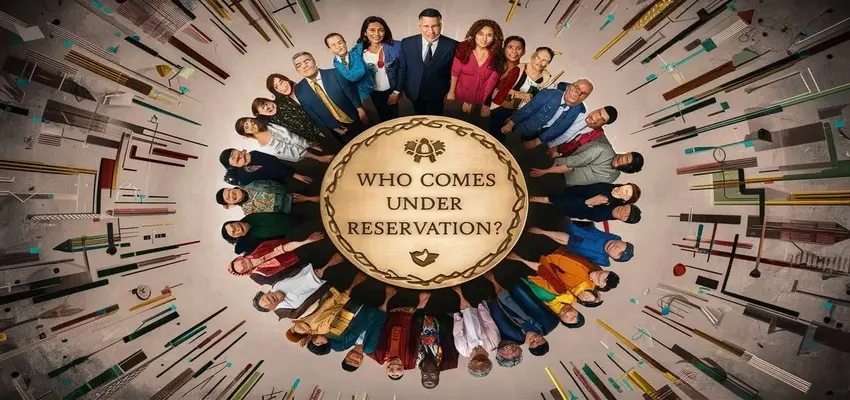Who comes under reservation?

Who Comes Under Reservation?
Reservation in India is the practice of allocating a certain number of seats in the many legislative houses, in any government position, and admittance to higher education institutions to the reserved classes. The main goal is to improve the living conditions of the underprivileged populations subjected to discrimination and exploitation over many decades.
The reservation system originated in the late nineteenth and early twentieth century when British officials first instituted quota systems to guarantee the participation of specific groups in government jobs and educational institutions. Following the Indian constitution, which gives the state authority to be enabled to offer particular amenities to any socially and educationally disadvantaged groups of people or for the Scheduled Tribes, post-independence also the policy of positive discrimination was carried on.
Under the reservation system, the following categories have been added throughout the decades: The following categories have been included under the reservation system throughout the decades:
More than sixty percent of them fall under the SCs and STs labels.
Considered untouchable and barred from mainstream society based on the Hindu caste system, these are the most deprived and disadvantaged groups in Indian culture. The Constitution permits a quota of 15% and 7.5% in government jobs, educational institutions, and legislatures for SCs and STs matching with their elevation and giving women equal possibilities.
Other Backward Classes (OBCs)
The Mandal Commission which submitted its report in the year 1980 described OBCs as “Other backward classes†and categorized them as socially and educationally backward classes to define OBCs using three criteria: social, educational, and economic backwardness. Later on, in 1992, the Supreme Court of India endorsed 27% of the reservation policy for OBC in central government jobs and admission in central universities and colleges. Regarding the state level, the limit for OBC reservations can be more than 27 percent but cannot exceed 50 percent.
Economically Weaker Sections (EWS)
The Scheduled castes and Scheduled tribes were given quotas of 7. 5% and 10% respectively besides the overall ceiling of 50% for all quotas by the 103rd Constitutional Amendment Act of 2019. The quota is for the unpaid, the unserved, and the unknown, all those who are not included in any of the above-mentioned schemes and whose family income is less than ₹ 800,000 per annum. But this is not based on caste and has been framed or developed purely based on economic factors.
Women
The purpose of this reformatory measure is to ensure that more women are involved in decision-making processes, especially at the grassroots level through the 73 & 74 constitutional amendments of 1993 which recommend that not less than one-third of the total seats in Panchayati Raj institutions & Urban Local Bodies be reserved for women. Some of the state legislations have gone further in providing for a higher percentage of seats to be reserved for women.
Persons with Disabilities
The Rights of Persons with Disabilities Act, 2016 mandates the reservation of 4% of the total vacancy in the Central Government establishments and the relevant areas in the establishments of the State Government, Union Territory, and the private sector and higher education institutions in adding to or reducing the existing quota of the general category for persons with benchmark disabilities including blindness, low vision, leprosy cured, hearing impairment, locomotor disability, mental retardation
Defense Personnel and Veterans
20% of seats are earmarked for the personnel of ex-servicemen including dependents of the slain service personnel and disabled service personnel in post-graduate courses, diploma courses, post postgraduate diplomas in Universities, affiliated colleges, and academic institutions.
In the last decades, several deprived categories have been added to the list of SCs & STs under the affirmative action policies in India; around 50% of the total seats and positions in different domains are now under some form of reservation system; while the extent of its application differs significantly at state and regional levels. Despite the noble intention of reservations to empower the downtrodden and diversify society, critics continue to argue over deterring meritocracy, the absence of a filter to reach the most deserving within the reserved categories, and social unrest among the unreserved population against shrinking opportunities in the face of stiff competition for limited scholarships and jobs. For meaningful affirmative action, such assessment and realignment should be done from time to time to ensure the growth and development of the socio-economic status of the various segments of society.
Call us at +1 833-902-2090 to secure the best deals on flight tickets today. Don't miss out on unbeatable prices for your next adventure!
